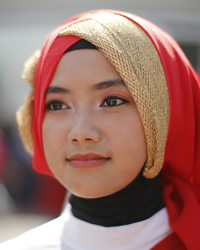Indonesian in Malaysia

Photo Source:
Endho - Pixabay
|
Send Joshua Project a map of this people group.
|
| People Name: | Indonesian |
| Country: | Malaysia |
| 10/40 Window: | Yes |
| Population: | 926,000 |
| World Population: | 10,982,200 |
| Primary Language: | Indonesian |
| Primary Religion: | Islam |
| Christian Adherents: | 15.00 % |
| Evangelicals: | 5.60 % |
| Scripture: | Complete Bible |
| Ministry Resources: | Yes |
| Jesus Film: | Yes |
| Audio Recordings: | Yes |
| People Cluster: | Malay |
| Affinity Bloc: | Malay Peoples |
| Progress Level: |
|
Introduction / History
Indonesians have historically represented a large portion of the Malaysian foreign workforce due to the close proximity of some of the large (and highly populated) Indonesian islands with Malaysia. Indonesians predominantly reside in the urban areas of Peninsular Malaysia. The large island of Sumatra is just a ferry ride across the narrow Straits of Malacca and the Indonesian province of Kalimantan borders the Malaysian states of Sabah and Sarawak on the island of Borneo. Partly as a security measure related to terrorism dangers, the Malaysian government determined early in 2002 that recruitment of foreign workers would be carried out on a Government-to-Government basis. At that time the foreign workforce was officially listed at around 800,000 with close to 600,000 of those being from Indonesia. In reality, the number of Indonesians working in Malaysia at that time may have substantially exceeded the numbers above. The Malaysian government took proactive steps to remove Indonesians working illegally and actively managed the number of Indonesian workers, as well as those from other countries.
What Are Their Lives Like?
Indonesian workers in Malaysia are predominantly in non-skilled or semi-skilled occupations such as domestic help, agriculture, grounds keepers, street cleaners, and construction. For many of these workers, their living conditions are dependent on their employers. Large employers in all sectors provide housing and transportation in fulfillment of some of the requirements of the government agreements. Even so, housing is often crowded and without sufficient basic necessities. Working conditions can include long hours and be physically demanding. Isolation on the job site or in living quarters sometimes occurs. Separation from families back in their home country is another hardship. Abuse of domestic help is quite common.
What Are Their Beliefs?
The religious beliefs of Indonesian migrant workers reflect the local culture from the parts of Indonesia that they come from. Practically all are Muslim but many come from backgrounds that include remnants of ancient tribal beliefs with animistic or spiritistic practices. Many of these people working as live-in domestic helpers situations in Malaysia will get exposure to the religions the households they work in. This includes Buddhism, Hinduism, Catholicism, and Evangelical Christianity.
What Are Their Needs?
The Indonesian migrant workers need good access to all the social services plus some specialized services related to their separation from families and their isolation in a foreign culture. In addition, some need protection from unfair exploitation by unscrupulous employers. In recognition of this, a special agency called the Foreign Workers Service and Counseling Centre (PPKPA) has been established and is opening offices in all 13 Malaysian states. Foreign workers who register with the Centre will be entitled to insurance coverage, legal advice, social services and, most importantly, a place to go to when they have been abused or exploited. However, probably only a small fraction of the Indonesian migrant workers are actually registered in the program.
Prayer Points
Their greatest need is for the Good News. Pray that these workers will hear and respond to the truth while they are in Malaysia.
Pray for them to look to the Lord for their spiritual and physical needs.
Pray that the Lord will raise up Indonesian disciples who will disciple others in Malaysia.